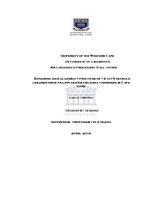Exploring digital literacy practices of 12- to 15-year-old children from Philippi and Khayelitsha townships in Cape Town
Abstract
Despite the spread of digital communication technologies and the integration of mobile
phones into everyday life, young children's literacy practices are changing rapidly, and
schools are struggling to address the potential of these digital communication technologies
for learning. Mobile phones are currently a key consumer item, an image of social capital,
and they initiate their users into a portable web of numerous applications including those
literacy related. Much research has been done on children's relationship with digital
technologies and the implications of this for their literacy learning and education in general,
but there is almost no research on this in the global south, and almost none in South Africa.
Filling this gap is crucial given the crisis in South Africa in basic education. The main aim
for this research is to establish the kinds of digital technology and information systems
affordances (internet facilities, tablets, books, magazines, newspapers, radios, TVs, video
and computer games, etc.) in the homes of the selected children to explore how these digital
technologies and information system affordances could be used to enhance the academic
literacy development of 12- to 15-year-old children in informal settlements or townships in
Cape Town.

